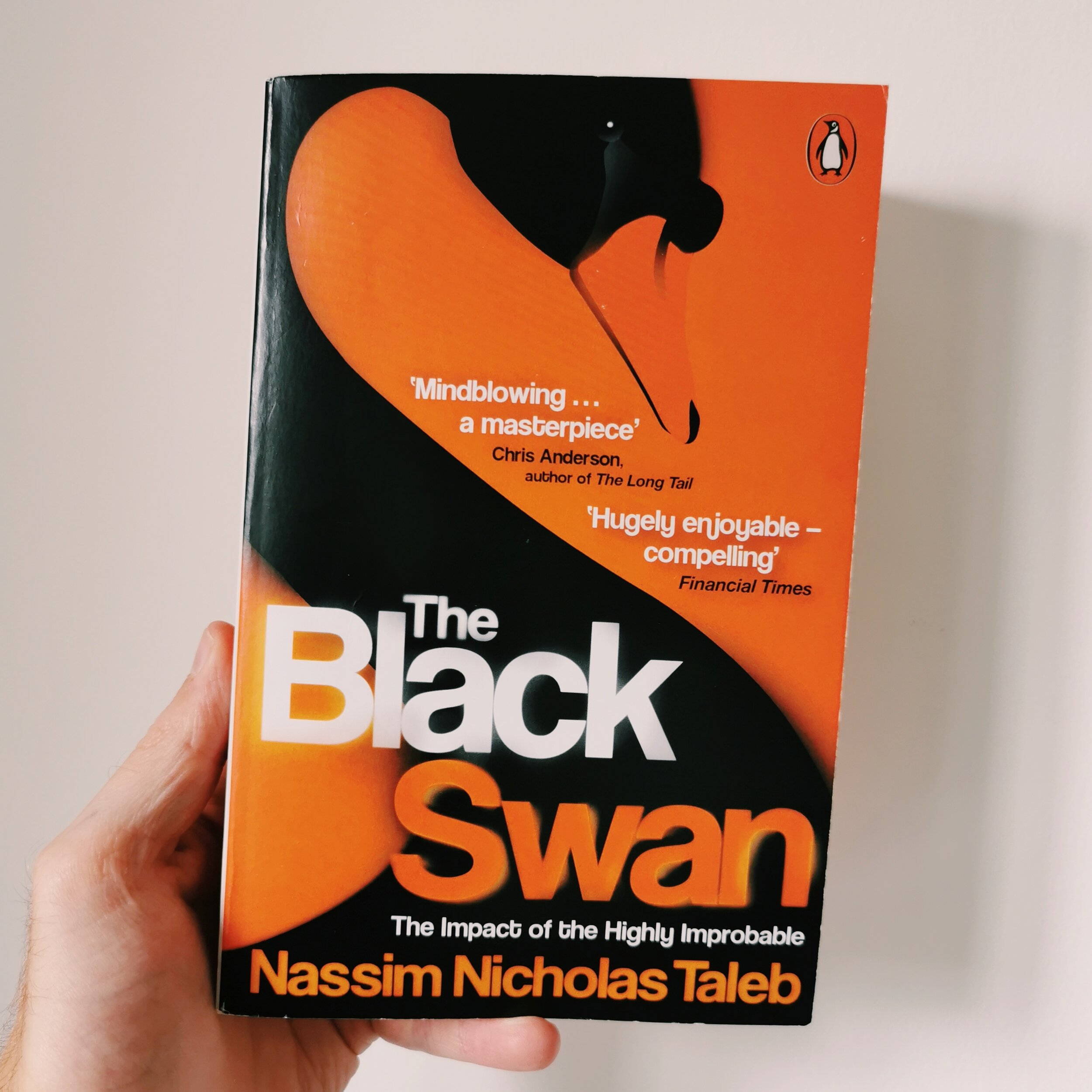The Black Swan - Nassim Nicholas Taleb
3-Sentence Summary:
A “Black Swan” describes an event that is an outlier, which has an extreme impact, and is only explainable after the fact.
The impact of these Black Swans outweighs the impact of the steady, predictable trends, but they aren’t included in our usual predictive models.
We should aim to be robust against the negative Black Swans, but be open to the positive Black Swans, accepting that we can’t predict the specifics of either of these.
Notes:
A “Black Swan” describes an event that is an (1) Unpredictable outlier, which (2) creates an extreme impact, and which (3) human nature makes us concoct explanations for, after the fact.
These can include ideas, inventions, religions, historical events, success stories, failures, life events, opportunities, stock market crashes, wars, etc.
These Black Swans have a greater impact than the small, regular, everyday occurrences, in spite of their rarity. (History jumps, not walks).
To leave these out in trends as anomalies, is to risk leaving out the very thing that affected the sample most.
Their existence means that what you don’t know is more important than what you do know.
We should aim to be open to positive Black Swans and protect ourselves against potential negative Black Swans (without trying to predict the specifics of either).
We automatically create stories out of things that happen, so that we can be prepared in future for similar occurrences because it’s less costly than having to remember specifics, but we usually leave out Black Swans in our predictions this way. We have to train ourselves to recognise this, and be aware of it. Also, focus on how things are, vs. how they should be.
Things that vary exist in 2 separate worlds:
1. “Mediocristan”: Non-scalable. Things increase/decrease with time/effort. Any outlier isn’t big enough to skew the data (Height - even if someone is extremely tall (e.g 8ft), it doesn’t increase average height much among 100 other people). Outcomes are predictable and similar. Physical quality. Slow and steady. “Fair”. No Black Swans.
2. “Extremeistan”: Things increase/decrease exponentially without the proportional time/effort. Outliers are extreme and easily skew the data (Bill gates in a group of 100, brings average net worth up massively). Outcomes vary hugely. No limits. Winner takes all. Open to Black Swans.
Like the Turkey being well-fed every day of December, no matter how much positive information you have, it can never prove the positive theory will hold going forward (if you do, you’re falling prey to naive empiricism and/or confirmation bias). However, it only takes one negative instance (head chopped off) to disprove it. Absence of evidence does not mean evidence of absence.
Our brain prefers frequent small wins, but success usually comes from staying consistent, tinkering, trial and error, and sticking at it until you get a Black Swans. Focus on the process rather than short-term results. You don’t know when the Black Swan is coming.
We often miss the silent evidence when looking at a sample. E.g. “Beginner’s luck” - the gamblers who didn’t win at the start didn’t keep going, so if you ask gamblers if winner’s luck exists, you’re seeing more of those who kept going because they won at the start and kept going. E.g. “Swimmer’s body” - It’s not swimming that gets them the body. It’s that those who made it had perfect bodies for swimming and therefore survived. E.g. Unsuccessful entrepreneurs also had the same virtues as successful. Risk taking, hard work, etc. so be aware of taking advice from the successful. Better to know the don’ts than the dos.
Studies show a massive difference between our confidence in our predictive abilities and the actual quality of that prediction.
We build toys/tools, and they change the world. We can’t predict how they will be used. E.g. computer.
The Barbell Strategy. Invest your time/money/effort in some extremely safe options (guard against negative Black Swans), and some extremely unpredictable options (open to positive Black Swans).
Things tend towards winners takes all, but if working right, the “winners” up to that point can also be taken out. (We shouldn’t bail out banks or big companies).
It’s better for things to fail early, as it’s less catastrophic. Also better to have plenty of smaller things to contrast the few big ones (The long tail). E.g Banks don’t have this, so failure would be disastrous.
Something can be a Black Swan for one person (The turkey), and not for another (The Butcher).
Be grateful because you being here is so unlikely that you are a Black Swan.
The ultimate robustness to a Black Swan: Amor Fati - Love Fate. Be prepared to lose it all and still be ok.
If you enjoyed this summary, you’ll probably enjoy the full book. Get it here: LINK TO BOOK (AMAZON)
Or get it for free on audiobook when you sign up for an Audible account: LINK TO AUDIOBOOK (AMAZON)
(This website uses amazon referral links as part of the Amazon Associates program.)
